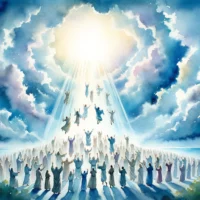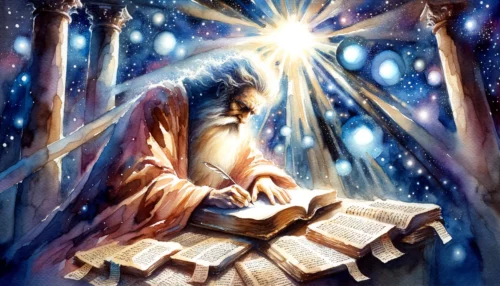As followers of Christ, we often turn to the Bible for guidance, wisdom, and understanding. When we delve into the intricacies of each book, we notice unique characteristics that distinguish them from one another. The Book of Esther, unique in its own right, stands out for a particular reason: God’s name is nowhere to be found. This absence raises many questions about the nature of God’s involvement and presence in our lives, and how we interpret His silence.
The Historical and Cultural Context of the Book of Esther
When it comes to the Book of Esther, understanding the historical and cultural context is key. The story is set in the Persian Empire, specifically in the capital city of Susa, during the reign of King Ahasuerus (Xerxes I), who ruled from 486 to 465 BC (Esther 1:1). The Book of Esther offers a narrative about the Jewish community living in the diaspora, far from their homeland, following the Babylonian exile.
Esther, a young Jewish woman, becomes queen to King Ahasuerus, while her cousin Mordecai holds a position in the king’s court. The drama intensifies when Haman, a high-ranking official who despises Mordecai for not bowing to him, hatches a plot to exterminate all the Jews in the Persian Empire (Esther 3:1-6). Esther, guided by Mordecai, uses her position to avert this catastrophe, culminating in the triumph of the Jewish people over their enemies (Esther 7:1-10).
Persia was a polytheistic society, where many gods and goddesses were worshiped. This was a stark contrast to the monotheistic belief of the Jews who worshiped Yahweh alone. Historians speculate that the absence of God’s name in the text might be due to the author’s intent to protect the Jewish community. Making explicit references to God could have been seen as subversive or even rebellious in the eyes of the Persian authorities, potentially endangering the Jewish community.
The book was written during a time when the Jews were a vulnerable minority in a vast empire. The absence of God’s name might also reflect a strategic decision by the author to increase the appeal and acceptability of the story among non-Jewish audiences. By doing so, the narrative of Esther could be shared more widely and without fear of immediate rejection due to its religious character.
The historical and cultural context of the Book of Esther offers crucial insights into the potential reasons for the absence of God’s name. Living in a polytheistic society, with different beliefs and practices, the Jews had to navigate their faith carefully. The author’s choice to keep God’s name out of the text might have been a protective measure to ensure the safety of the Jewish community and to make the story more accessible to a broader audience. Thus, the absence of God’s explicit mention does not undermine His existence or role; instead, it reflects the realities of living and practicing faith in a diverse cultural environment.
Possible Theological Reasons for God’s Absence
In addition to the historical and cultural context, theological implications also come into play when discussing the absence of God’s name in the Book of Esther. It is interesting to note that while God’s name is not explicitly mentioned, His handiwork can be seen throughout the book. The events in Esther’s life and the victory of the Jewish people might be seen as evidence of God’s providence.
The story unfolds in a series of remarkable coincidences and turns of events that lead to the salvation of the Jews. Esther becomes queen just in time to intervene on behalf of her people (Esther 2:17). Mordecai happens to be in the right place at the right time to uncover a plot against the king (Esther 2:21-23). The king cannot sleep on the very night that he should be reminded of Mordecai’s good deed (Esther 6:1-3). Haman’s downfall and the Jewish people’s victory happen against all odds (Esther 7:10). These are not random events; rather, they seem to point to a divine orchestration happening behind the scenes.
The absence of God’s name can be seen as a narrative device to highlight the theme of God’s providence and the hiddenness of His actions. The Hebrew Scriptures often depict God working in obvious ways, such as parting the Red Sea or speaking from Mount Sinai. However, in Esther, His work is less visible but nonetheless present. This could be a reminder that even when we do not see or hear God explicitly, He is still at work in our lives.
This perspective could also be seen as a reflection of the lived experiences of many faithful individuals. There are times in life when God’s presence may not be felt or His voice not heard. These “Esther moments” may make us question God’s presence or His concern for our lives. The Book of Esther serves as a powerful reminder that even in those times, God’s providential care is still at work.
Understanding the theological underpinnings of God’s absence in Esther can offer comfort and assurance to believers. The story underscores the truth that God’s presence isn’t always marked by grand miracles or booming voices from heaven. Sometimes, God’s work is hidden in the seemingly ordinary events of life. This could be interpreted as an affirmation of God’s subtle yet continuous involvement in the world and in the lives of His people. The Book of Esther serves as a reminder that God is at work even when He seems silent, orchestrating events for the good of His people.
How God’s Presence is Implied in the Book of Esther
While the name of God is not explicitly mentioned in the Book of Esther, His presence can be implied in several ways. It’s not just the string of ‘coincidences’ that imply divine intervention, but also the values and actions of the characters which align with God’s teachings.
Esther and Mordecai, the protagonists of the story, exhibit virtues such as courage, wisdom, and faithfulness—values that are strongly endorsed in the rest of the Bible. For example, Esther’s bravery in risking her life to save her people (Esther 4:16) reflects the biblical principle of sacrificial love. Mordecai’s refusal to bow down to Haman (Esther 3:2) could be interpreted as a steadfast commitment to the first commandment—worshiping God alone.
The Jewish community’s response to threats also points to a belief in a higher power. When faced with extermination, the Jews, led by Mordecai and Esther, fast and mourn (Esther 4:3). Fasting is a spiritual practice in Jewish tradition, often done to seek God’s favor and intervention. Although the text does not explicitly say they prayed, the act of fasting suggests a turning to God in their time of distress.
The celebration of Purim, which originates from the events of this book (Esther 9:20-28), is a clear sign of God’s implicit presence. Purim, celebrated by Jews to this day, is a time of joy and thanksgiving for their deliverance from the plot of Haman. Even though God is not named, the festival’s very existence speaks of a divine saving act in history.
While the Book of Esther may not mention God by name, His presence permeates the narrative. Through the virtues and actions of the characters, the spiritual practices of the Jewish people, and the institution of Purim, God’s hand is subtly but surely seen. The book is a testament to God’s providential care, working behind the scenes and through ordinary people to accomplish His purposes. The story of Esther invites us to look for God’s presence even in the silent moments, assuring us of His continuous work in our lives.
Finding God in the Silence
The Book of Esther offers a profound narrative that, despite the absence of God’s name, teems with evidence of His providential care and work. From the historical context to the theological undertones and the implied presence of God, this unique book provides a comprehensive insight into the hidden ways God moves in our world and in our lives.
Consider these questions as you reflect on the Book of Esther:
- How does understanding the historical and cultural context change your perspective on the absence of God’s name in the Book of Esther?
- In what ways can you see God’s providence at work in the story of Esther, and how does this relate to your own experiences?
- How might the character traits and actions of Esther and Mordecai inspire you in your own faith journey?
In the narrative of life, there might be moments when God seems silent, and His name appears to be absent from our circumstances. But just like in the Book of Esther, He is often working behind the scenes, orchestrating events for our good. Even in the silence, He is present, guiding, protecting, and leading us according to His perfect plan.














